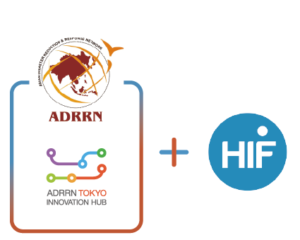Why partnership?
With growing challenges posed by the intensity and scale of disasters in Asia, more humanitarian agencies are looking for new and innovative ways to increase their efficiency and effectiveness. Asian Disaster Reduction and Response Network (ADRRN), a network of civil society organizations in Asia, set ‘grassroots innovation’ as a major thematic focus in its strategy, and in December 2016, convened the Regional Innovation Forum (RIF-Asia) in Bangkok with nearly 100 local practitioners and thought leaders present to generate and develop new solutions.

To accelerate this initiative, our strategic partnership with the Humanitarian Innovation Fund (HIF) was launched in March 2017.The partnership is aimed at enhancing the understanding of innovation and access to innovation resources, leveraging the strength of both organizations which are the vast and family-like local practitioners’ network of ADRRN, and the accumulated knowledge and experience of the HIF on how to develop innovation project.
What is the achievement so far?
In the last six months of partnership, 18 organizations and 108 individuals learned the concept of humanitarian innovation through the workshops, and gained access to innovation resources and support. The workshops were designed to meet the needs of each organizations, the major components including issue analysis, concept ideation, and developing project plan. The overall average satisfaction rate of the workshop was 90%.
As an output of the workshops, 21 innovative ideas were generated and developed, and ADRRN Tokyo Innovation Hub (ATIH) followed up with the progress of those ideas, and in several cases, connected the teams with other innovation players to further develop the ideas. In addition, access to financial resource was provided by HIF for 8 teams who participated in the workshop co-organized by the HIF and ADRRN, funded by ECHO. All of them were granted the opportunity to apply for HIF’s seed fund exclusively offered to the participants, and 7 applied. The process is underway to finalize the grantees.
What are the major learnings?
Localizing the concept of humanitarian innovation: The concept of humanitarian innovation is new to most of the organizations, and therefore, the expression and examples used in the workshops needs to be localized to facilitate the participants’ understanding.
Commitment of the management: Continued dialogue and interaction with the management can be the key to successful intervention.
Internal resource to catalyze innovation: It takes time for the innovation culture and process to change, and therefore, assigning dedicated innovation officers under direct supervision of the management can be a powerful enabler for innovation.
How are we going to move forward?
The workshops will be continued to be offered, and the ideas generated and developed will be supported by ATIH and HIF by means of consultation and seed fund provision.
In addition to such individual support, we strive to develop methodologies and case materials building on our experience and learnings that cater to the innovation needs of local and national NGOs. They will be shared on the ATIH’s website, and discussed in RIF-Asia 2017 to be convened in Bangkok in December.